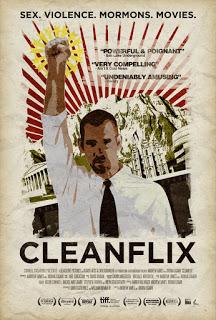
Directed By: Andrew James, Joshua Ligairi
Starring: Ray Lines, Allan Erb, Scott Nybo
Tag line: "Sex. Violence. Mormons. Movies"
Trivia: Premiered at the 2009 Toronto International Film Festival
In April of 1986, Ezra Taft Benson, President of the Church of Jesus Christ of Latter Day Saints, addressed the faithful at a Utah conference, during which he touched on a number of topics. One he felt particularly strongly about was the “lewd and suggestive” entertainment industry, which, if left unchecked, might pollute minds with its “degrading matter”. “Don’t see R-rated movies”, Benson said that day, and thousands upon thousands of Mormons heeded his advice.
Fortunately, they wouldn’t have to give up movies like Goodfellas and Schindler’s List forever. Launched in 2000 by an entrepreneur named Ray Lines, Clean Flicks was a Utah-based company that edited R and PG-13 rated films, removing all “objectionable” content (bad language, sex, violence) so that Mormon families could enjoy them without putting their eternal souls in jeopardy. Co-directed by Andrew James and Joshua Ligairi, the 2009 documentary Cleanflix takes us inside the world of edited movies, from its earliest days right up to the end, when Hollywood (specifically, the Director’s Guild) cried foul, and fought to put Clean Flicks and its many imitators out of business. An in-depth, often riveting film, Cleanflix tells the entire story… and then some.
By way of interviews and archived news footage, Cleanflix covers all the necessary bases, from product demand (we meet a good number of Mormons, including college students at Brigham Young University, who say that under no circumstances would they watch an R rated movie); to supply (along with Ray Lines, who provides a quick overview of how his editing service worked, we’re introduced to shop owners Daniel Thompson and Robert Perry, both of whom hopped on the Clean Flicks bandwagon early enough to make some serious money with it); to, eventually, the end of the line, when the Directors Guild successfully sued to have Clean Flicks shut down (among the filmmakers who chime in on the issue are Curtis Hanson, Steven Soderbergh, and former Mormon Neil LaBute, who, due to his past association with the church, had a few interesting things to say). In addition, we take a look at some of the films Clean Flicks “cleaned up” over the years, watching first a scene from the original, uncut movie, followed by the exact same scene in the Clean Flicks version (the cut sequence in The Matrix was done well enough, but a funny moment from The Big Lebowski was completely ruined by extensive edits).
As it turns out, though, the life and death of Clean Flicks wasn’t all there was to this particular story.
While most of those associated with Clean Flicks threw in the towel once the court order was issued, shop owner Daniel Thompson decided to stand and fight. Claiming he found a loophole in the copyright law, Thompson kept his store open, continuing to sell sanitized versions of Hollywood films. As a result, he became a local media darling (in one very entertaining scene, the camera is affixed on Thompson as he listens to a radio piece about his battle to stay afloat), and even resorted to questionable business practices. Alas, Thompson would eventually lose the fight, and, to the surprise of those who supported him for so many years, he and an associate were arrested a few months later and charged with committing a sex crime.
This sad state of affairs does fit nicely into the overall Clean Flicks story, due in part to Thompson’s association with the company, but mostly because it exposed a hypocrisy in what was intended to be a very moral, virtuous endeavor. That said, Daniel Thompson’s personal tragedy also stands well enough on its own, offering a sort of “documentary within a documentary”. The portion of the film dealing with Clean Flicks Is intriguing, to say the least, but by keeping the cameras rolling, directors James and Ligairi managed to take Cleanflix in a completely new, yet equally fascinating direction.
